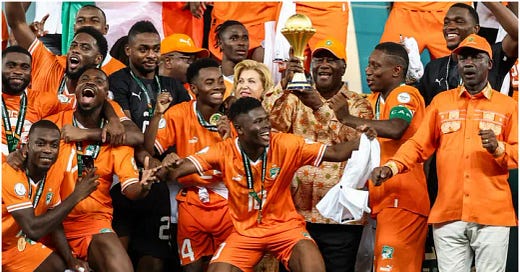On Court Philippe-Chatrier at Roland Garros in Paris, the quote ‘Victory belongs to the most tenacious’ is proudly displayed. It is believed to have come originally from former French emperor Napoleon I, but it has come to aptly represent the ethos of that Grand Slam, defined as it is by heaving, grunting 14-time winner Rafael Nadal.
On Sunday night in Abidjan, economic capital of former French colony Cote d’Ivoire, victory did not so much belong to the tenacious – although the Elephants certainly were – as to the fresher, fitter side. The team with better resource management over the course of a month won, claiming a third Africa Cup of Nations (AFCON) title.
For all its twists and turns, football can really be that simple at times, its outcomes rooted in commonsense and cold logic. It is, after all, a sport for everyone, even the officious pencil-pusher.
Côte d'Ivoire, imbued with new life after coming back from the brink, played their best, most dominant match of the tournament. A teeming Stade Alassane Ouattara, with the man himself present to glory in the evening, bore witness to what ultimately felt like a fait accompli. In many ways, it rehashed the 2017 final: one side trying to play football, going behind against the run of play, ramping up the pressure and then levelling around the hour-mark, before having victory sealed late on by a striker who had been absent for much of the tournament.
By the time Franck Kessie headed home the equaliser, the game was only ever going in one direction, and that feeling of inevitability was confirmed by a flick of Sebastien Haller’s right boot inside the last 10 minutes of regulation time.
That there had seemed any jeopardy in it at all was simply an extension of the improbability that had defined the tournament to that point. Nigeria, pinned back from the blast of Dahane Beida's whistle, were grateful to a booming strike by captain William Troost Ekong for the lead, but offered nothing of any weight in response to the steady, piston-like jab of the Ivorians. But stranger things had happened, and both sides had cause to feel, coming in, that cosmic providence was in their favour. Something had to give, and here it was the will of the Super Eagles.
This, in plain terms, was a case of accumulated fatigue. Jose Peseiro, having appeared to stumble upon an alchemy that turned a sleeping giant into a major threat, was loath to countenance even the slightest variation on the theme, tactically or in terms of selection.
Silver Bullets
Just when you thought you were out, the Super Eagles pulled you back in. It only took a win to overwrite all the negativity that had been etched onto the hearts of Nigeria fans, but it was not simply the case that any old win would have done. No, it needed to be the sort of win to reassert Nigeria as, once again, a competitive member of the continent’s …
To have as many as eight players start every single match in the tournament was ridiculous enough, but to lean into that with a deliberately small squad, in the suffocating humidity of Cote d’Ivoire, and with a system based around not having the ball was going to lead to collapse at some point. It was only a matter of when.
That the bill came due in the final seemed cruel but, like the fabled Igbo deity Agbala, football takes life away when it is sweetest. So close to the ultimate prize, the Super Eagles' performance was devoid of vitality and ideas, with the players lacking the clarity that had made their passive defensive approach vaguely viable all tournament long.
Simple solutions – passes into the far side half-space, for instance, or the inside-forwards dropping to allow for cleaner progression – were eschewed in favour of tired, aimless punts upfield, overlaps were sporadic and, when the ball did enter the final third, invention and turbo were in short supply.
So, deeper and deeper they sank into the muck in Ebimpe, until they hit silver. The refereeing was rather suggestible, but in truth it was a mercy that the scoreline wound up as close as it was, and there can be no complaints from anyone. In fairness, no one from the Nigeria camp made any excuses, and there were very few tears shed at the end. Regret comes from a sense of performing below available capacity, but the Nigeria players rightly did not feel that they had done so on the night.
If there is any disappointment, it is that Cote d'Ivoire barely even needed to extrapolate upon their established, well-worn system. It was basic, albeit with brio and intent, but with no counter-move to respond to, it was enough to seize the initiative and hold onto it for 101 total minutes of play. The Walking Dead? More like the Grateful Dead.
It was, in truth, a far better final than many expected, if somewhat anticlimactic by virtue of Nigeria’s no-show. In the battle between the Unthinkables and the Improbables, the Unthinkables won.




